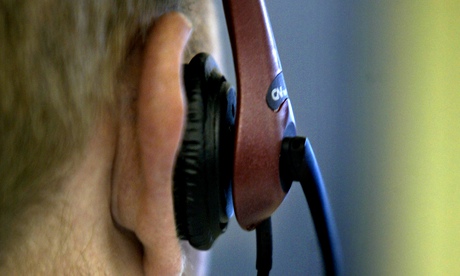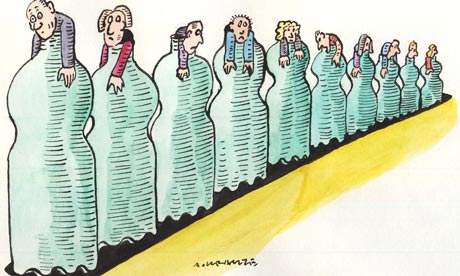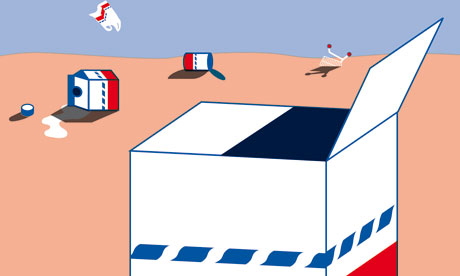Dear FBI agents, my name is Carole Cadwalladr and in February this year I was asked to investigate the so-called "dark net" for a feature in this newspaper. I downloaded Tor on to my computer, the anonymous browser developed by the US navy, Googled "Silk Road
drugs" and then cut and pasted this link
http://silkroadvb5piz3r.onion/ into the address field.
And bingo! There it was: Silk Road, the site, which until the FBI
closed it down on Thursday and arrested a 29-year-old American in San Francisco, was the web's most notorious marketplace.
The "dark net" or the "deep web", the hidden part of the internet invisible to Google, might sound like a murky, inaccessible underworld but the reality is that it's right there, a click away, at the end of your mouse. It took me about 10 minutes of Googling and downloading to find and access the site on that February morning, and yet arriving at the home page of Silk Road was like stumbling into a parallel universe, a universe where eBay had been taken over by international drug cartels and Amazon offers a choice of books, DVDS and hallucinogens.
Drugs are just another market, and on Silk Road it was a market laid bare, differentiated by price, quality, point of origin, supposed effects and lavish user reviews. There were categories for "cannabis", "dissociatives", "ecstasy", "opioids", "prescription", "psychedelics", "stimulants" and, my favourite, "precursors". (If you've watched
Breaking Bad, you'll know that's the stuff you need to make certain drugs and which Walt has to hold up trains and rob factories to find. Or, had he known about Silk Road, clicked a link on his browser.)
And, just like eBay, there were star ratings for sellers, detailed feedback, customer service assurances, an escrow system and a busy forum in which users posted helpful tips. I looked on the UK cannabis forum, which had 30,000 postings, and a vendor called JesusOfRave was recommended. He had 100% feedback, promised "stealth" packaging and boasted excellent customer reviews: "The level of customer care you go to often makes me forget that this is an illegal drug market," said one.
JesusOfRave boasted on his profile: "Working with UK distributors, importers and producers to source quality, we run a tight ship and aim to get your order out same or next day. This tight ship also refers to our attitude to your and our privacy. We have been doing this for a long time … been playing with encryption since 0BC and rebelling against the State for just as long."
And so, federal agents, though I'm sure you know this already, not least because the
Guardian revealed on Friday that the National Security Agency (NSA) and GCHQ have successfully cracked Tor on occasion, I ordered "1g of Manali Charras [cannabis] (free UK delivery)", costing 1.16 bitcoins (the cryptocurrency then worth around £15). I used a false name with my own address, and two days later an envelope arrived at my door with an address in Bethnal Green Road, east London, on the return label and a small vacuum-packed package inside: a small lump of dope.
It's still sitting in its original envelope in the drawer of my desk. I got a bit stumped with my dark net story, put it on hold and became more interested in the wonderful world of cryptocurrencies as the value of bitcoins soared over the next few months (the 1.5 bitcoins I'd bought for £20 were
worth £300 at one point this spring).
Just under a month ago I was intrigued to see that
Forbes magazine had managed to get an interview with "Dread Pirate Roberts", the site's administrator. And then, last week,
came the news that Dread Pirate Roberts was 29-year-old Ross Ulbricht, a University of Texas physics graduate who, according to the FBI's documents, had not just run the site – which it alleges earned him $80m in commission – but had hired a contract killer for $80,000 to rub out an employee who had tried to blackmail him.
If that sounds far-fetched, papers filed last Thursday show that he tried to take a contract on a second person. The documents showed that the FBI had access to Silk Road's servers from July, and that the contract killer Ulbricht had thought he'd hired was a federal agent. It's an astonishing, preposterous end to what was an astonishing, preposterous site, though the papers show that while the crime might have been hi-tech, cracking it was a matter of old-fashioned, painstaking detective work.
Except, of course, that it's not the end of it. There are two other similar websites already up and running – Sheep and Black Market Reloaded – which have both seen a dramatic uplift in users in the last few days, and others will surely follow. Because what Silk Road did for drugs was what eBay did for secondhand goods, and Airbnb has done for accommodation: it created a viable trust system that benefited both buyers and sellers.
Nicholas Christin, a professor at Carnegie Mellon University in Pittsburgh, Pennsylvania, who conducted
six months of research into the site, said that what surprised him most was how "normal" it was. "To me, the most surprising thing was how normal, when you set aside the goods being sold, the whole market appears to be," he said. And, while many people would be alarmed at the prospect of their teenagers buying drugs online, Silk Road was a whole lot more professional, regulated and controlled than buying drugs offline.
What's apparent from Dread Pirate Roberts's interview with Forbes and comments he made on the site's forum is that the motivation behind the site does not seem to have been making money (though clearly it did: an estimated $1.2bn), or a belief that drugs hold the key to some sort of mystical self-fulfillment, but that the state has no right to interfere in the lives of individuals. One of the details that enabled the FBI to track Ulbricht was the fact that he "favourited" several clips from the Ludwig von Mises Institute, a libertarian Alabama-based thinktank devoted to furthering what is known as the Austrian school of economics. Years later, Dread Pirate Roberts would cite the same theory on Silk Road's forum.
"What we're doing isn't about scoring drugs or 'sticking it to the man'," said Dread Pirate Roberts in the Forbes interview. "It's about standing up for our rights as human beings and refusing to submit when we've done no wrong."
And it's this that is possibly the most interesting aspect of the story. Because, while Edward Snowden's and the
Guardian's
revelations about the NSA have shown how all-encompassing the state's surveillance has become, a counterculture movement of digital activists espousing the importance of freedom, individualism and the right to a private life beyond the state's control is also rapidly gaining traction.
It's the philosophy behind innovations as diverse as the
3D printed gun and
sites as mainstream as PayPal, and its proponents are young, computer-savvy idealists with the digital skills to invent new ways of circumventing the encroaching power of the state.
Ulbricht certainly doesn't seem to have been living the life you imagine of a criminal overlord. He lived in a shared apartment. If he had millions stashed away somewhere, he certainly doesn't seem to have been spending it on high-performance cars and penthouses.
His LinkedIn page, while possibly not the best arena for self-expression for a man being hunted by the FBI, demonstrates that his beliefs are grounded in libertarian ideology: "I want to use economic theory as a means to abolish the use of coercion and aggression amongst mankind," he wrote. "The most widespread and systemic use of force is amongst institutions and governments … the best way to change a government is to change the minds of the governed … to that end, I am creating an economic simulation to give people a firsthand experience of what it would be like to live in a world without the systemic use of force."
Silk Road, it turns out, might have been that world. Anybody who has seen
All the President's Men knows that, when it comes to criminality, the answer has always been to "follow the money". But in the age of bitcoin, that's of a different order of difficulty. Silk Road is just one website; bitcoin is potentially the foundation for a whole new economic order.








